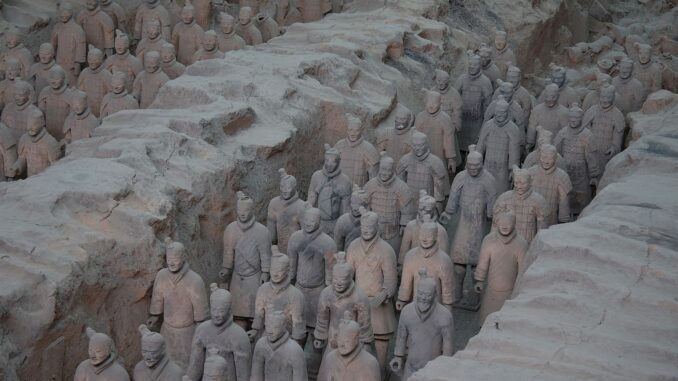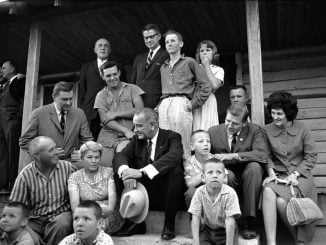
March 27
1939: The first NCAA men’s Division I basketball championship game was held, with the University of Oregon defeating Ohio State, 46-33.
1973: Marlon Brando refused to accept his Oscar for best actor in “The Godfather,” and sent in his place actor and activist Sacheen Littlefeather.
1975: Construction began on the Trans-Alaska Pipeline; the 800-mile (1,290-kilometer) pipeline was completed just over two years later.
March 28
1898: The U.S. Supreme Court, in United States v. Wong Kim Ark, ruled 6-2 that Wong, who was born in the United States to Chinese immigrants, was an American citizen.
1941: Author Virginia Woolf, 59, drowned herself near her home in England.
1969: The 34th president of the United States, Dwight D. Eisenhower, died at age 78.
1979: America’s worst commercial nuclear accident occurred with a partial meltdown inside the Unit 2 reactor at the Three Mile Island plant near Middletown, Pennsylvania.
March 29
1974: Chinese farmers found fragments underground where archaeologists would ultimately discover terra-cotta sculptures of more than 8,000 soldiers and other figures. The “” would become one of the most significant archaeological discoveries of the 20th century.
1951: Julius and Ethel Rosenberg were convicted in New York of conspiracy to commit espionage for the Soviet Union.
1971: Army Lt. William L. Calley Jr. was convicted of murdering 22 Vietnamese civilians in the 1968 My Lai massacre.
1973: The last United States combat troops left South Vietnam, ending America’s direct military involvement in the Vietnam War.
March 30
1822: Florida became a United States territory.
1867: U.S. Secretary of State William H. Seward reached agreement with Russia to purchase the territory of Alaska for $7.2 million, a deal ridiculed by critics as “Seward’s Folly.”
1981: President Ronald Reagan was shot and seriously injured by John W. Hinckley Jr.
March 31
1492: King Ferdinand and Queen Isabella of Spain issued an edict expelling Jews from Spanish soil, except those willing to convert to Christianity.
1814: Paris was occupied by a coalition of Russian, Prussian and Austrian forces; the surrender of the French capital forced the abdication of Emperor Napoleon.
1968: President Lyndon B. Johnson stunned listeners by declaring, “I shall not seek, and I will not accept, the nomination of my party for another term as your President.”
April 1
1865: During the Civil War, Union forces routed Confederate soldiers in the Battle of Five Forks in Virginia.
1891: The Wrigley Co. was founded in Chicago by William Wrigley, Jr.
1945: American forces launched the amphibious invasion of Okinawa during World War II.
1976: Apple Computer was founded by Steve Jobs, Steve Wozniak and Ronald Wayne.
April 2
1792: Congress passed the Coinage Act, which authorized establishment of the U.S. Mint.
1917: President Woodrow Wilson asked Congress to declare war against Germany, saying, “The world must be made safe for democracy.”
2005: John Paul II, the Polish pope born Karol Józef Wojtyła, who became one of the most influential leaders of the 20th and early 21st centuries, died at age 84.



